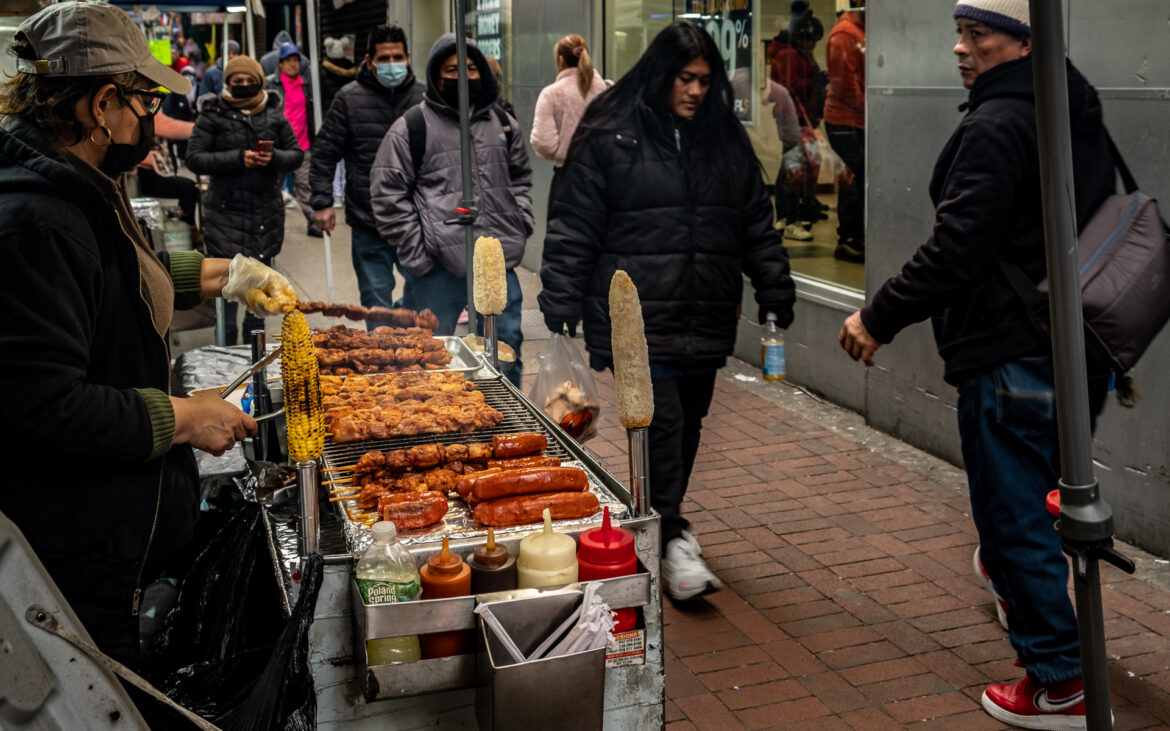Two years after the passage of Local Law 18—intended to overhaul street vending regulations and add hundreds of additional licenses to the market each year—councilmembers are weighing another package of changes, including one bill that would lift the cap on licenses altogether.

Adi Talwar
A street vendor on Roosevelt Avenue in Jackson Heights, Queens, in 2022.In 2021, the NYC Council passed long-sought reforms to the city’s street vending rules—ordering the issuance of hundreds of new vending licenses per year after a decades-long cap on that number, which vendors said made it nearly impossible for most of them to operate legally.
But two years later, “street vending in New York City is broken,” City Councilmember Pierina Sanchez said during a Council oversight hearing Wednesday, where lawmakers mulled another set of changes to the sector in which an estimated 20,000 residents—many of them immigrants—earn their living.
Of the reforms under consideration, Sanchez’s Intro. 1270 would be the most substantial: it would gradually increase the number of licenses available for food and general vendors each year for five years, then do away with the cap on licenses altogether. That limit, vendors and advocates say, has for decades fueled a black market for the permits and subjected sellers unfairly to penalties.
“We crush [the] hard work of street vendors in the city without giving them an opportunity to have a license,” Sanchez said at the start of the meeting. “New York City is the only jurisdiction that regulates street vendors with a cap system the way that we do. It’s not working for us. Nobody else does it.”
But Wednesday’s oversight hearing didn’t explicitly take up Sanchez’s bill—which is likely to face opposition from brick-and-mortar business owners, often at odds with vendors—to the disappointment of advocates and vendors who testified.
Instead, the Council deliberated on six other pieces of legislation related to vending rules: prohibiting sellers in bike lanes, regulating where vendors could operate on bridges and eliminating certain requirements, like one that forces food vendors to obtain a Certificate of Sales Tax Authority from the state to operate.
Another bill, sponsored by Councilmember Shekar Krishnan, would do away with criminal penalties related to vending. While most enforcement comes in the form of civil fines and summonses, under current law, vendors who operate without a license can be subject to a misdemeanor punishable by a fine of up to $1,000 or imprisonment of up to three months, or both.
From January to September 2023, police issued 127 criminal summonses related to vending, according to Krishnan. “Our vendors, our smallest businesses, should not be treated in a way that criminalizes them simply for providing for their families,” the lawmaker said.
Representatives from the NYPD did not testify at Wednesday’s hearing, though those from three other agencies involved in regulating vendors—the departments of Health and Mental Hygiene (DOHMH), Consumer and Worker Protection (DCWP) and Sanitation (DSNY)—did.
DSNY took over as the main enforcement agency this spring, an effort from Mayor Eric Adams’ administration to curb “quality of life issues” related to vending that’s led to high-profile sweeps of vendors in hubs like Corona Plaza. DCWP, the agency that led enforcement previously, does not have the authority to confiscate goods from vendors, which Sanitation does.
“We focus on the infractions that affect communities the most—things like obstructing sidewalks, curb cuts, building and subway entrances, leaving equipment and goods out overnight and creating dirty conditions,” Ryan Merola, deputy commissioner for external affairs at DSNY, told councilmembers Wednesday, saying the agency takes a “compliance first approach, rather than a license-check first approach.”
Still, since April 1, the department has confiscated more than 100,000 pounds of produce from vendors during inspections, which was then donated to a network of local food pantries, according to Merola. Seized food that can’t be donated is turned over for composting, he added.
In the first four months of 2023, the city received around 2,000 311 complaints related to vending, officials said.
Vendors and advocates who spoke at Wednesday’s hearing said they aren’t opposed to enforcement, but argued that the current system—in which licenses and permits are capped at just 853 for general vendors and 2,900 for citywide mobile food vendors—makes it impossible for the majority of sellers to operate legally.
The City Council reforms passed in 2021, known as Local Law 18, created a new licensing and permitting system for food vendors, requiring the city to issue 445 of those new licenses and permits each year for 10 years. DOHMH has so far issued 342 “supervisory licenses” to applicants, 108 of whom have also applied for the accompanying permit, officials testified Wednesday.
But vendors argued that expansion is a drop in the bucket compared to demand: Approximately 10,000 people are on the waitlist, meaning thousands will remain locked out of the system even after Local Law 18 is fully implemented in nearly a decade.
“They are likely going to receive a license in 75 years from now, towards the end of the century,” quipped Mohamed Attia, director of the advocacy group Street Vendor Project.
He called on the Council to schedule another hearing on Sanchez’s bill to remove the limit on licenses. “We have an opportunity to step up, do the right thing, reform the system,” he testified.
To reach the reporter behind this story, contact Jeanmarie@citylimits.flywheelstaging.com









One thought on “Lawmakers Seek More Changes to NYC’s Street Vending Rules”
Thank you for spending your precious time sharing this rewarding information! We really need the same information! I hope you can share more.